Please activate JavaScript in your browser to use all interface options.
Rosneft Enterprises Switch to Circular Economy
15 November 2024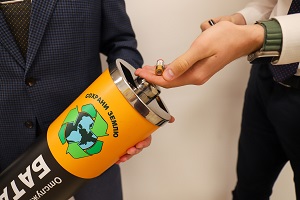
World Recycling Day is celebrated in Russia and other countries on 15 November. The day’s main aim is to raise awareness of the need for the sustainable use of resources and the importance of recycling.
Rosneft pays great attention to environmental safety and is constantly working to minimise its impact on the environment. Improving the efficiency of waste management processes is one of the priority goals of the Rosneft-2030 strategy.
Rosneft actively implements the principles of circular economy in its operations. The Company’s production enterprises have successfully implemented zero-waste technologies that enable the production of artificial soil, an environmentally friendly construction material, from drilling cuttings. To date, RN-Vankor has processed around 20,000 tonnes of drilling waste.
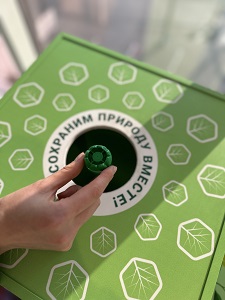 The Company’s Samara Group enterprises — the Syzran, Kuibyshev and Novokuibyshevsk refineries — recycled almost 300 tonnes of spent catalyst, while the Novokuibyshevsk Oils and Additives Plant recycled more than 2 tonnes of scrap reinforced concrete, asphalt and construction waste.
The Company’s Samara Group enterprises — the Syzran, Kuibyshev and Novokuibyshevsk refineries — recycled almost 300 tonnes of spent catalyst, while the Novokuibyshevsk Oils and Additives Plant recycled more than 2 tonnes of scrap reinforced concrete, asphalt and construction waste.
More than 8,000 tonnes of non-ferrous and ferrous metals were sent for processing by the Achinsk, Saratov, Syzran, Kuibyshev, Novokuibyshevsk refineries, RN-Vankor and Bashneft subsidiaries.
The Kuibyshev and Novokuibyshevsk refineries, as well as the RN-Vankor and Bashneft enterprises, also shipped around 4,500 tonnes of waste oils, emulsions, tank-cleaning sludge, and petroleum products.
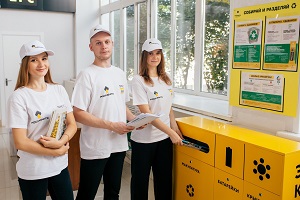 As part of the Green Office project, Rosneft enterprises organised the separate collection of recyclable materials. Batteries, accumulators, light bulbs, glass, paper and plastic are collected and sent to specialised companies for recycling, with the proceeds donated to charity. In 2024 alone, the Company donated around 180 tonnes of waste paper for recycling. Top performers in paper and cardboard collection include employees from Bashneft (47 tonnes), Samaraneftegaz (over 16 tonnes), Achinsk Refinery (almost 16 tonnes), Kuibyshev Refinery (15 tonnes), Novokuibyshevsk Refinery (14 tonnes), RN-Uvatneftegaz (over 10 tonnes) and RN-Vankor (9 tonnes). Rosneft is also reducing its annual office paper consumption by transitioning to an electronic document management system.
As part of the Green Office project, Rosneft enterprises organised the separate collection of recyclable materials. Batteries, accumulators, light bulbs, glass, paper and plastic are collected and sent to specialised companies for recycling, with the proceeds donated to charity. In 2024 alone, the Company donated around 180 tonnes of waste paper for recycling. Top performers in paper and cardboard collection include employees from Bashneft (47 tonnes), Samaraneftegaz (over 16 tonnes), Achinsk Refinery (almost 16 tonnes), Kuibyshev Refinery (15 tonnes), Novokuibyshevsk Refinery (14 tonnes), RN-Uvatneftegaz (over 10 tonnes) and RN-Vankor (9 tonnes). Rosneft is also reducing its annual office paper consumption by transitioning to an electronic document management system.
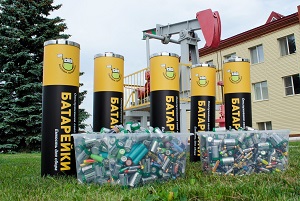 During this year’s “Batteries, Give Up!” campaign, employees of the Company’s subsidiaries across all operating regions handed in 1,100 kg of used batteries, uninterruptible power supplies, and disposable batteries for recycling. The most active participants were Bashneft (250 kg), Angarsk Petrochemical Company (240 kg), and Kuibyshev Refinery (130 kg). By doing this, employees are making a significant contribution to preserving soil and water resources, as just one battery can pollute 20 square metres of land or 400 litres of water.
During this year’s “Batteries, Give Up!” campaign, employees of the Company’s subsidiaries across all operating regions handed in 1,100 kg of used batteries, uninterruptible power supplies, and disposable batteries for recycling. The most active participants were Bashneft (250 kg), Angarsk Petrochemical Company (240 kg), and Kuibyshev Refinery (130 kg). By doing this, employees are making a significant contribution to preserving soil and water resources, as just one battery can pollute 20 square metres of land or 400 litres of water.
In 2024, Rosneft employees collected and handed over 7 tonnes of plastic for recycling.
Employees from Bashneft, Rospan International, Samotlorneftegaz, RN-Uvatneftegaz, SevComneftegaz, RN-Yuganskneftegaz, Orenburgneft, the Kuibyshev and Komsomolsk refineries, and the Novokuibyshevsk Petrochemical Company, as well as research and design institutes, are taking part in the Kind Lids volunteer project run by the Volunteers for Orphans Charitable Foundation. The foundation uses the proceeds from the plastic lids to support children with special needs.
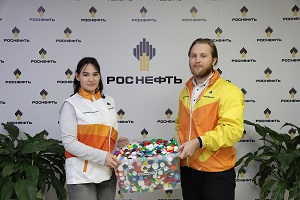 Employees from Saratov Refinery, together with students from Rosneft classes and specialised universities, are taking part in the city’s environmental campaign, “Algae is Covered!”. Money raised from returned lids is used to buy fry of silver carp, carp and white amur, which will help restore the river ecosystem and clear excessive vegetation from the Volgograd Reservoir.
Employees from Saratov Refinery, together with students from Rosneft classes and specialised universities, are taking part in the city’s environmental campaign, “Algae is Covered!”. Money raised from returned lids is used to buy fry of silver carp, carp and white amur, which will help restore the river ecosystem and clear excessive vegetation from the Volgograd Reservoir.
Rosneft enterprises pay great attention to environmental education, promoting a careful attitude towards nature and useful ecological habits among young people. Rospan International volunteers traditionally organise the Clean Energy ecological quest for the younger generation at Russia’s northernmost zoo, the Children’s Ecological Station in Novy Urengoy.
Employees from the Novokuibyshevsk Oils and Additives Plant deliver informative environmental education sessions on waste recycling to children at kindergartens and schools across the Samara Region.
With the support of the Ryazan Scientific and Production Association, children from the Host of Meshchera organisation took part in the El GrECO environmental education camp in the Kaluga Region. There, they learnt about separate waste collection and how to make jewellery and household items from old clothes.
The practical implementation of circular economy processes is an important agenda item at general corporate events and scientific and practical conferences.
Department of Information and Advertising
Rosneft
November 15, 2024

-315xx70.png)

